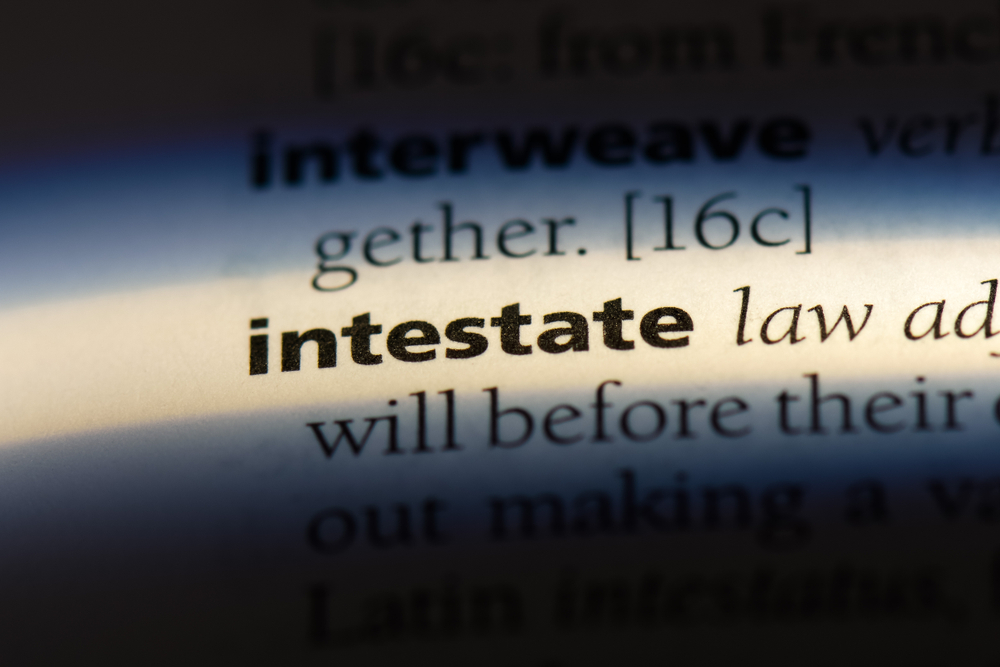

Legal Insight. Trusted Advice.
Recent Successes And News: Month: July 2023
What Happens If You Die Without a Will?
Last Will and Testaments determine who gets an individual’s assets upon death. Generally, people can use wills to pass their estate to whomever they wish.
Although state laws impose some restrictions, such as preventing married people from disinheriting their spouses without consent, testators can distribute their assets to chosen individuals, such as family, friends, stepchildren, and godchildren, as well as to charities.
Those who die without a will — in other words, who die intestate — cannot distribute their money and possessions according to their unique wishes. When this happens, state laws take effect to determine who receives the estate.
Intestacy Laws
When people pass on without a valid will, state intestacy laws determine who will acquire any assets that did not transfer outside of probate. While laws vary by state, they often provide that an estate goes to a deceased person’s spouse and children.
In New York State, the law provides that if a person passes intestate, the property is distributed based on who the living relatives are and their relationship to the Decedent (the person who died). If the Decedent has a spouse, and no children, then the spouse inherits everything. If the Decedent has children, but no spouse, then the children inherit everything. If the Decedent has a spouse and children, then the spouse inherits the first $50,000 plus half of the balance and the children inherit everything else. If no spouses and children survive the individual, other family members, such as parents, siblings, nieces, nephews, and cousins, receive the estate. For those who die without any surviving family, the property will go to New York State.
Non-Probate Assets
Even when people die intestate, they might have assets that transfer without a will. These assets transfer outside probate, the court-supervised proceeding that authenticates a will.
Wills do not apply to non-probate property unless individuals designate their estate as a beneficiary. (Non-probate assets bypass the court process and go directly to your beneficiaries.) Non-probate assets include certain real estate with survivorship rights, IRAs, insurance policies payable to a named beneficiary, and pay-on-death accounts.
For instance, if a person owns property with a partner as a joint tenant with the right of survivorship and dies intestate, the partner will retain the property. Naming a person as a beneficiary on an account or policy allows an asset to transfer without a will.
Reasons Why People Die Intestate
Though many use wills to distribute property, individuals might not have a will in place when they die for several reasons. They might never have created a will. Or, they attempted to form a will, but the court deems it invalid.
In some cases, the probate court might find that a will is invalid because the testator did not follow the requirements to create a valid will. For example, they might have lacked proper witnesses when executing the document, neglected to identify beneficiaries, or failed to sign it.
In other cases, a person might challenge the will. The challenger could assert that the testator lacked the mental capacity to make the will or that someone exerted undue influence over the decedent.
The Benefits of Wills
For those who die without a will, state laws typically distribute assets to close family. Although these statutes can protect spouses and children, they do not account for individuals’ unique wishes. People who want to leave assets to those not recognized by their state’s intestacy laws or want to make charitable donations could benefit from executing a will.
Individuals can also make specific bequests in a will, leaving special gifts to individuals. Suppose a grandmother wants to pass a treasured necklace down to her favorite granddaughter. In that case, she could make a specific bequest to her granddaughter in her will.
Comprehensive Estate Planning
While wills have many benefits, for many, they are just one part of a more extensive estate plan. To learn more about creating a estate plan for transferring your assets when you pass, speak to the Estate Planning Attorneys at Kommer Bave & Ciccone LLP.
Attorney Advertising
Are Wills Public Record?: Estate Planning Q&A
Wills contain important information about who receives money, possessions, and property upon a person’s death. Who can view this information, and is it a public record?
Once your will goes through probate, it becomes a public record. The probate court must maintain the will so that the public can access it. Anyone can visit the probate court to view the will, regardless of whether they are an heir or beneficiary. For a fee, they can obtain a copy. In some counties, wills are also available online.
Why Are Wills Public Records?
Numerous individuals could have a right to receive assets from an estate when someone dies. During probate, the deceased’s personal representative, also known as an executor, satisfies debts and distributes assets to beneficiaries.
Sometimes, the probate process overlooks creditors or beneficiaries entitled to a portion of the estate. When this happens, they can bring claims against the estate. They must bring claims within the applicable time limit or statute of limitations, which depends on state law. Public access to wills makes bringing claims easier for those with a right to an estate.
When Do Wills Become Public Records?
Before probate, wills are not yet public records. Individuals often create several wills in their lifetimes as they update their plans; only the final will becomes a public record. In many cases, their estate planning attorney retains the will, or they keep it in a secure location. They might share copies with their loved ones.
The law does not require wills to be public records during the lifetime of the testator (the person making the will). Some jurisdictions allow people to file their wills with the court, yet this practice is uncommon.
When the will becomes public depends on the deceased person’s jurisdiction. To validate a will and begin the process of asset distribution, the personal representative petitions the probate court. In some states, the will and other probate records could be public while the court probates the estate. For many other states, however, the will becomes a public record after the court closes probate.
Probate courts have the power to make wills private. However, this only happens in rare cases under specific circumstances. If a will underwent probate, it is likely a public record available through the court that probated it.
How to Find Out If Someone Has a Will
Talking to your loved ones about where they keep their wills and other estate planning documents is a good idea. Yet, many people are unsure whether their loved one made a will before passing away.
You can find out whether someone has a will by:
- Checking with the probate court in the jurisdiction where the person died
- Searching your loved one’s home
- Consulting with others to determine if an executor is carrying out your loved one’s wishes
How to Find a Will in Public Records
If you are an heir, beneficiary, or creditor to an estate, you might be interested in locating the will.
Since wills become public records after probate, you could find the will by identifying the court that administered probate. If probate has already occurred, this process may be straightforward.
The personal representative must notify you if you are an heir or beneficiary to an estate. The executor must also provide the location of the court overseeing probate. Heirs and beneficiaries are generally entitled to a copy of the will.
Are Trusts Public Record?
Some people might wish to transfer their assets privately. To do this, they can set up a more comprehensive estate plan using trusts. Trusts are generally not part of the public record.
An effective estate plan often consists of more than a will. If you are looking for more information on estate planning and the rules governing wills and trusts, consult with the Estate Planning Attorneys at Kommer Bave & Ciccone LLP.
Attorney Advertising
Activities of Daily Living and the Need for Long-Term Care
Most long-term care involves assisting with basic personal needs rather than providing medical care. The long-term care community measures personal needs by looking at whether an individual requires help with basic activities.
ADL Meaning
ADLs, or activities of daily living, are six basic activities that most people do every day without assistance. ADLs are important to understand because they are used to gauge an individual’s level of functioning. This, in turn, determines whether the individual qualifies for assistance like Medicaid or has triggered long-term care insurance coverage.
What Are the 6 ADLs?
The six ADLs are generally recognized as:
- Bathing. The ability to clean oneself and perform grooming activities like shaving and brushing teeth.
- Dressing. The ability to get dressed by oneself without struggling with buttons and zippers.
- Eating. The ability to feed oneself.
- Transferring. Being able to either walk or move oneself from a bed to a wheelchair and back again.
- Toileting. The ability to get on and off the toilet.
- Continence. The ability to control one’s bladder and bowel functions.
Instrumental ADLs
There are other more complicated tasks that are important to living independently, but aren’t necessarily required on a daily basis. These are called instrumental activities of daily living (IADLs) and include the following:
- Using a telephone
- Managing medications
- Preparing meals
- Housekeeping
- Managing personal finances
- Shopping for groceries or clothes
- Accessing transportation
- Caring for pets
Long-term care providers use ADLs and IADLs as a measure of whether assistance is required and how much assistance is needed. In order to qualify for Medicaid home care benefits, New York State will do an assessment to verify that an applicant needs assistance with ADLs. In addition, the Managed Long Term Care (MLTC) provider will also conduct an assessment to determine whether long term care services are appropriate. In addition, long-term care insurance usually uses the inability to perform two or more ADLs as a trigger to begin paying on the policy.
To learn more about long-term care and Medicaid, contact the qualified elder law attorneys at Kommer Bave & Ciccone LLP.
Attorney Advertising
What It Means to Need ‘Nursing Home Level of Care’ for Medicaid Eligibility
When applying for Medicaid’s long-term care coverage, in addition to the strict income and asset limits, you must demonstrate that you need a level of care typically provided in a nursing home.
Whether you are applying for nursing home coverage or through a Medicaid waiver program for coverage at home, you must meet the level-of-care requirement set by the state. Each state has its own criteria for determining if you meet the mandated level of care, and the criteria is not always clear.
The state looks at an applicant’s functional, medical, and cognitive abilities to determine if care in a nursing home is called for. In general, you must be unable to care for yourself or pose a danger to yourself without outside help. The following are the factors usually considered when making a level-of-care determination:
- You need help with two or more “activities of daily living” (such as bathing, dressing, eating, moving, and going to the bathroom).
- You need frequent medical care, such as assistance with medication, injections, IVs, or other medical treatment.
- Your cognitive ability is impaired by Alzheimer’s disease or another form of dementia, you have trouble making decisions on your own, or you are unable to process information.
- You have behavior problems, such as wandering away from home or aggressiveness.
When assessing a Medicaid applicant, the state will conduct the evaluation. The state may require a doctor’s diagnosis, but it will also likely require the applicant to answer a series of questions about his or her ability to perform activities of daily living as well the applicant’s mental abilities and behavior problems and the applicant’s family’s ability to provide support.
The elder law attorneys at Kommer Bave & Ciccone LLP can help you navigate the Medicaid application process.
Attorney Advertising
Recent Posts
Archives
- April 2025
- January 2025
- November 2024
- October 2024
- August 2024
- July 2024
- June 2024
- May 2024
- April 2024
- March 2024
- January 2024
- December 2023
- November 2023
- October 2023
- September 2023
- August 2023
- July 2023
- May 2023
- April 2023
- March 2023
- January 2023
- December 2022
- November 2022
- October 2022
- September 2022
- August 2022
- July 2022
- June 2022
- May 2022
- February 2022
- October 2021
- August 2021
- March 2021
- January 2021
- December 2020
- November 2020
- May 2020
- April 2020
- March 2020
- February 2020
- August 2019
- May 2019
- February 2019
- April 2018
- January 2018





